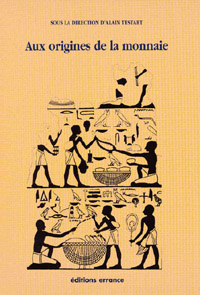
This summary only deals with the part written by A. Testart : Moyen d'échange / moyen de paiement : Des monnaies en général et plus
particulièrement des primitives (Means of Exchange/Means of Payment:
Currencies in General, with Emphasis on Primitive Communities, pp. 11-60).
This short essay is neatly divided into two parts.
The first (pp. 11-34) is a reappraisal of common theories in the field
of political economy, and is followed by a critical commentary on the
usual definition of currency/money; a new definition is suggested
thereafter. The second part (pp. 34-60) applies this definition to
primitive societies, gives precisions on its specificity, and
concludes with evolutionary considerations on money and currency.
At the beginning of the paper the author starts by
dismissing the idea of a solely anthropological definition of money.
Economists, anthropologists, historians and other scholars in social
sciences must refer to the same reality, use the same concepts and
quote the same definitions if they indeed want to understand each
other and exchange opinions.
The accuracy and appropriateness of the traditional
definition of money/currency in political economics, through its
supposed “function”, is put to question. Before possessing any
function, money must be seen as a good, a source of wealth, and even a
precious object that one can own.
The author criticizes two conservative theories on
money: the first mistaken idea is that currency is a merchandise like
any other. Money is truly a good, a merchandise in the trading world
of modern economics, yet it is unlike any other. The second idea, that
of money as a sign, is also dismissed: this hypothesis appears in the
thesis written by Georg Simmel, one its most important defendants, and
is opposed by the author.
Contrary to what has generally been thought, the
definition of money in terms of function does not antedate the
nineteenth century. The exact list of traditional functions attributed
to currency (a means of exchange and of treasuring goods, a unit used
in counting) was only accepted with scepticism in the field of
political economics. The main ambiguity derives from the confusion
between means of exchange and means of payment, as these two notions
have been erroneously assimilated. Yet to pay is quite different from
exchanging goods: when one pays taxes, money is used as means of
payment, but nothing is exchanged at all.
The notion of means of payment is more general and
accurate than that of means of exchange. Once a good has been accepted
as means of payment, other functions (including that of means of
exchange) logically appear.
Following these critical considerations (entirely
relevant and internal to political economy) the author suggests the
following definition :
"We consider as money or currency :
- one or several kinds of goods, the quantity of these being
limited,
- whose transfer in determined quantities within a paying community
is prescribed or preferred in the case of most payments and possesses
discharging value.
"A definition that must follow economic principles
does not have to list either all or the main properties of the object
being defined; it only has to expose the minimal properties from which
others can be induced. From the previous definition one can infer
without any problems that: money is either the good par excellence or
a supreme form of wealth; the general acceptance of money as means of
payment; its subsequent functions as a means of exchange, of storage
and a value standard."
This new definition is essential in order to
understand to what extent one can speak of money and currency in
primitive economies: it is clear that what can be termed “money” in
this field does not principally fulfil the function of means of
exchange. This aspect was discovered by both Max Weber at the
beginning of the twentieth century and the authors of the two most
remarkable works on primitive currency (these studies were both
published in 1949) : Paul Einzig and Hingston Quiggin, who were
subsequently almost entirely ignored by social anthropologists. These
scholars understood perfectly that primitive currencies were rarely
used for exchange but were mainly meant as payment in order to face
social obligations: paying for the price of blood (the widespread
tradition called wergeld in the Germanic mediaeval world) ; paying for
a bride, an even more common custom implying payments essential for
marriage.
It is still necessary to ask why these goods are not
used for exchanging purposes (or are only used to this end in a
subsidiary manner). The reasons are manifold. The first one is poor
social division of labour. The second reason lies in the importance of
credit in primitive societies. The third explanation, probably the
most important one, is linked to the previous one: material exchange
does not take place according to trading terms, i.e. anonymously and
between people that take decisions following only considerations of
quantity and value: exchange happens between individuals that know
each other and who are linked to each other by friendship (these
relationships should be described as “exchange friendships”). Personal
relationships explain why credit frequently happens, entirely
eliminating the need for money as a means of exchange.
The last part of the paper draws a number of
conclusions on the evolution of the monetary phenomenon. As noted by
many economists, the unlimited development of credit could totally
suppress the need for a currency. This is more or less what happens in
primitive societies. Moreover, credit is by definition entirely
personal. Money means the invention of anonymity. Primitive societies
hardly need money because they are mostly structured by personal
relationships. When they do invent money or establish a currency (communities
without money unquestionably exist), it is in order to face social
obligations, because these currencies will first of all concern people
or rights over these people. It is only subsequently that money,
objects in themselves (and anonymous objects at that) will be used to
exchange things.
| 
